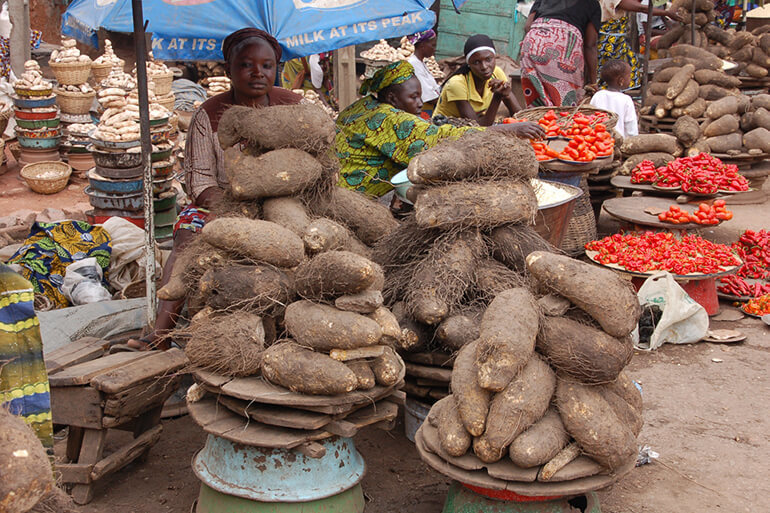Ayomidele Oluwasusi

The prices of 1 kilogram (kg) of beans, tomatoes and 12 pieces of agric medium sized eggs in Nigeria – rose above 200 percent year-on-year in July 2024, the National Bureau of Statistics (NBS) said on Monday.
NBS is the main National Agency responsible for the development and management of official statistics, the authoritative source and custodian of official statistics in Nigeria.
According to NBS’s Food Price Watch Report for July 2024, the price of 1 kg beans brown (sold loose) increased by 262.98 percent YoY to N2,444.81 in July 2024 from N673.53 recorded in July 2023.
Similarly, there was a 203.57 percent YoY increase in the price of 1kg of tomato to N1,693.83 in July 2024 from N557.96 in July 2023.
Also, the average price of 1kg of yam tuber increased by 234.23 percent to N 1,802.84 in July 2024 from N 539.41 in July 2023.
Furthermore, the price of 12 medium sized agric eggs experienced a 155.5 percent increase YoY to N2,170.17 in July 2024 from N1,006.64 in July 2023.
“Selected Food Price Watch for July 2024 shows that the average price of 1kg beans brown (sold loose) stood at N2,444.81. This indicates a rise of 262.98 percent in price on a YoY basis from N673.53 recorded in July 2023 and a 6.63 percent rise in price on a month-on-month (MoM) basis from N2,292.76 in June 2024,” NBS said.
“Agric eggs medium size (12 piece) experienced significant price increases year on year by N2,170.17 from N1,006.64 in July of last year (2023).
“On a MoM basis, the average price of this item rose by 12.11 percent from N 1,935.69 in June 2024.
“There was also a notable price increase of tomato 1kg by 203.57 percent on a YoY basis from N557.96 in July 2023 to N1,693.83 in July 2024.
“On a MoM basis, it decreased by -26.43 percent from N 2,302.26 in June 2024.
“Furthermore, the average price of 1kg Garri white sold loose went up by 167.98 percent on a YoY basis from N 429.89 in July 2023 to N 1,151.79 in July 2024, while there was an increase of 1.43 percent on a MoM basis.
“Also, the average price of 1kg of Yam tuber increased by 234.23 percent on a YoY basis from N 539.41 in July 2023 to N 1,802.84 in July 2024.
“On a MoM basis, it decreased by -10.82 percent from N 2,021.55 in June 2024 to N 1,802.84 in July 2024.”
The watchdog further said that the state profile analysis in July 2024 reveals that the highest average price of 1kg of bean brown (sold loose) was recorded in Rivers state at N 3,070.96 while the lowest was in Adamawa state at N 1,532.23.
“The highest average price of 1kg of tomato was recorded in Osun at N 3,000 while the lowest was in Kaduna State at N761.45.
“Regarding the average price of 1kg of yam tuber, Kwara state recorded the highest price at N 3,894.08, while Adamawa recorded the lowest price at N742.95.
“Gombe recorded the highest average price of 1kg garri white sold loose at N1,624.72, while the lowest was reported in Taraba at N 892.98,” NBS added.
Nigeria is facing its worst economic crisis in decades, with skyrocketing inflation, a national currency in free-fall and millions of people struggling to buy food. Only two years ago Africa’s biggest economy, Nigeria is projected to drop to fourth place this year.
The pain is widespread. Unions strike to protest salaries of around $20 a month. People die in stampedes, desperate for free sacks of rice. Hospitals are overrun with women wracked by spasms from calcium deficiencies.
Although President Bola Tinubu increased the minimum wage — after strike action and months-long negotiations with labour unions — from N30,000 to N70,000, his government has increased spending for officials at a time of nationwide starvation.
For workers earning the new N70,000, or $43, per month minimum wage, capricious inflation and naira value have inflicted too much damage for the changes to make any difference in their lives.
The crisis is largely believed to be rooted in two major changes implemented by Mr Tinubu, elected 14 months ago: the partial removal of fuel subsidies and the floating of the currency, which together have caused major price rises.
Earlier in August, Amnesty International accused Nigerian security forces of killing at least 21 protesters during a week of economic hardship protests.
Police and other security agencies clamped down on protests after thousands of people joined rallies against government policies and the high cost of living from August 1st to 10th.
Security forces denied responsibility for deaths during the protests.
A nation of entrepreneurs, Nigeria’s more than 200 million citizens are skilled at managing in tough circumstances, without the services states usually provide. They generate their own electricity and source their own water. They take up arms and defend their communities when the armed forces cannot. They negotiate with armed kidnappers when family members are abducted.
But right now, their resourcefulness is being stretched to the limit.
